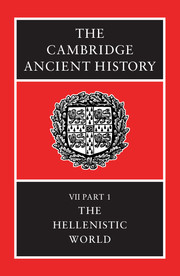Book contents
- Frontmatter
- 1 Sources for the period
- 2 The succession to Alexander
- 3 Monarchies and monarchic Ideas
- 4 The formation of the Hellenistic kingdoms
- 5 Ptolemaic Egypt
- 6 Syria and the East
- 7 Macedonia and Greece
- 8 Cultural, social and economic features of the Hellenistic world
- 9 Hellenistic science: its application in peace and war
- 9a Hellenistic science
- 9b War and siegecraft
- 9c Agriculture
- 9d Building and townplanning
- 10 Agathocles
- 11 The Syrian-Egyptian Wars and the new lingdoms of Asia Minor
- 12 Macedonia and the Greek leagues
- BIBLIOGRAPHY
- Index
- Map 3. Egypt.
- Map 4. Hellenistic Asia.
- Map 5. The Greek mainland and the Aegean.
- References
9a - Hellenistic science
from 9 - Hellenistic science: its application in peace and war
Published online by Cambridge University Press: 28 March 2008
- Frontmatter
- 1 Sources for the period
- 2 The succession to Alexander
- 3 Monarchies and monarchic Ideas
- 4 The formation of the Hellenistic kingdoms
- 5 Ptolemaic Egypt
- 6 Syria and the East
- 7 Macedonia and Greece
- 8 Cultural, social and economic features of the Hellenistic world
- 9 Hellenistic science: its application in peace and war
- 9a Hellenistic science
- 9b War and siegecraft
- 9c Agriculture
- 9d Building and townplanning
- 10 Agathocles
- 11 The Syrian-Egyptian Wars and the new lingdoms of Asia Minor
- 12 Macedonia and the Greek leagues
- BIBLIOGRAPHY
- Index
- Map 3. Egypt.
- Map 4. Hellenistic Asia.
- Map 5. The Greek mainland and the Aegean.
- References
Summary
INTRODUCTION
Although there are marked continuities between classical and Hellenistic science, the conditions and circumstances in which scientific investigations were conducted, and to some extent the nature of those investigations themselves, were, in certain respects, changed in the Hellenistic world. Four points that concern the different strands of scientific research to varying degrees are (1) the greater inter-penetration of Greek and non-Greek ideas, (2) the increasing specialization of the sciences, (3) the development of new centres of research (especially Alexandria) and of institutions (such as its Museum and Library), and (4), connected with the last point, the increase in kingly patronage.
First and most obviously, the science of the Hellenistic world is not a purely Greek phenomenon. The cross-fertilization between Babylonian and Greek astronomy, especially, is increasingly important from the fourth century B.C. onwards. Thus in the second century Hipparchus was able to draw extensively on Babylonian data, and the only astronomer we know to have followed Aristarchus of Samos in adopting the heliocentric theory was Seleucus, a Chaldaean or Babylonian from Seleuceia, who was active around 150 B.C.
Even in the classical period there were fairly well-defined distinctions between ‘philosophers’, ‘mathematicians’ and ‘doctors’. Yet as practised, notably by Aristotle, philosophy embraced a wide range of what we should call scientific enquiries, both physical and biological, all of which were considered to make an important contribution to the knowledge that the philosopher should attain. In the post-Aristotelian period, both Epicureanism and Stoicism certainly included ‘physics’ as one of the three branches of ‘philosophy’ (the other two being logic and ethics).
Keywords
- Type
- Chapter
- Information
- The Cambridge Ancient History , pp. 321 - 352Publisher: Cambridge University PressPrint publication year: 1984
References
- 32
- Cited by

